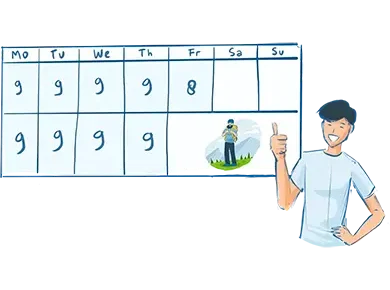What is time management and why do we need it
Time management is a notion we come across every step of the way. Although this notion has existed since the late 1800, its importance seems to keep growing with each passing day.
In recent years, everything seems to be happening at a different rate. Lately, even time itself seems to go by much faster. We often find ourselves saying, “I have a lot to do, but I don’t have enough time.”
And yet, the time has not changed. Same as always, the day is still 24 hours, no more and no less. Therefore, time is the same, but it is no longer enough for us. Then, what else has changed?
One of these things is the fact that we want to do more things. Definitely, we all want to accomplish more. And, by the way, this is great by all means!So, let’s see what we can do to make this happen in the time we have at our disposal.
What is time management
When we generally talk about management, we have to keep in mind that we are referring to an entire process. It usually involves procedures like planning, organizing, coordinating, and controlling. Noteworthy, we can apply these procedures to different resources in order to achieve our established goal. Besides, a common feature of all these resources is that they are finite.
For example, we can apply management to resources such as financial, human, natural, or technological. Of course, each of these can be managed in such a way as to help us achieve the desired result.
What about the time? Certainly, it is a finite resource. But, can we control it? Can we intervene in the flow of time to slow it down or increase its speed according to our needs? Of course not. And then, what is time management really about?
According to those described above, it is also a process that involves planning, organization, coordination, and control. But, in this case, we will not actually apply these procedures on “time” itself. On the contrary, the subjects of these procedures are in fact our actions and activities. Therefore, we will actually manage what we do during the period we’ve got at our disposal.
Why do we need time management?
The reason we are interested in time management is that we want to achieve more. And we want that on all levels. Moreover, we want to accomplish more in less time.
From a person’s point of view, this is needed in both professional and private life. Especially, it’s about the fact that we want to have more time for the things we love to do. For this reason, we strive to do quickly and well what we HAVE to do. As a result, we’ll have more time available for the things we WANT to do.
Equally important, time management is vital for any organization. Whether small companies or large corporations, their goal is the same, namely to increase profits. It is well known that the latter increases with productivity. Therefore, good time management is a necessity for any company that wants to increase its productivity and implicitly the profit.
Basic principles of time management
As mentioned earlier, each management process consists of applying several procedures. These are exactly the basic principles of time management and here’s how it works:

Planning

Organizing

Coordinating

Controlling
Planning
Rigorous planning is important in any situation. Especially when we want to make the most of our time. But, what does planning entail?
- First of all, let’s set the goals we want to achieve. Without well-established goals, we wouldn’t even know where to start, much less where to go
- Secondly, let’s set priorities in everything we have to do. If we work randomly, without respecting a certain order, we will not reach the desired results. Moreover, we risk consuming precious time on activities that are unimportant or unrelated to our goals
- Thirdly, let’s draw your directions. In other words, we must set the intermediate objectives to achieve on our way to the main goals
- Fourth, we need to set realistic deadlines for our goals, objectives, and day-to-day activities. If we don’t know how long we have to finish something, we may never finish. Or, at least not finish in time.
- Fifth, let’s make our plans in advance. For example, we can make our weekly to-do list the previous weekend. Also, we can prepare our daily to-do list the night before.
Organizing
Therefore, we have established what we want to achieve and in what time period. Moreover, we know what we have to do about it. So what’s the next step? Let’s organize ourselves in order to take the necessary actions. Here is what we can include in the organization procedure:
- Make sure that we have at our disposal any additional materials that we may need to comply with the planning made. For example, we can include here technologies such as a computer and a phone. Or, anything else we would need depending on the specifics of our job
- Let’s arrange things in such a way that we can carry out our activities in that part of the day when we know we are the most productive.
- As much as possible, make sure we have a specific place to work and decorate as we wish
Coordinating
We planned, we organized and we started working. But at the same time, we must be aware that unforeseen situations can occur. And we don’t want them to turn our entire schedule upside down. For this reason, we must try as much as possible to respect what we set out to do. But let’s be careful not to overdo it and become rigid with our plans. Therefore, in the coordination procedure we can include some of the following:
- Avoid distractions or interruptions that are not necessarily necessary
- Stick to the established schedule and avoid procrastination
- Be flexible with our plans and willing to make any necessary changes
Controlling
At all times we must be able to check whether we are on the right track or whether we have deviated from what we set out to do. For this, we may need to do an audit of how we work from time to time. In this regard, the milestones or intermediate objectives are very useful. They can help us easily notice any delays. Thus, we will not have unpleasant surprises related to meeting deadlines.
For example, PlanArty includes Planned VS Done functionality. It displays in real-time an objective comparison between your plans and the reality of the activity carried out. Of course, such functionality is extremely useful in any situation. Especially since you can see in due time any deviation from planning. Like this, you can make any necessary adjustments on the go.
What do you need to apply, strategies, methods, or techniques?
To know what we need, we must first clearly determine what each one represents. So here’s what each one means and what the differences are between them:
Time management strategies
Strategy is a broader notion. This often includes planning, organizing, and implementing. Therefore, a time management strategy represents a series of actions planned, organized, and implemented in our way of working. It is advisable to apply it over our overall working way. The final result must be the fact that you will successfully make the most of your time.
A time management strategy is also something that you can set based on your own preferences. Here are some things to keep in mind when setting it up:
| Determine what your goal is | → | e.g to improve time management |
| Define how you want to work | → | set your own terms and conditions |
| Choose your favorite tools | → | planner, time tracking solution |
| Decide on the method you want to use | → | preferably apply one at a time |
| Work accordingly | → | follow the steps you set |
| Make any necessary adjustments | → | take action when needed |
You can also use well-established time management strategies with proven efficiency. At the same time, keep in mind that the same thing will not work perfectly for everyone. Therefore, a strategy that fits very well in a particular field of activity may not be the right one for you. For this reason, it is recommended that you document yourself initially and, if possible, test a few. Thus, you can choose the one with which you feel most comfortable to apply.
Time management methods
Method is a term that refers to the way something is done.
Accordingly, a time management method implies a series of actions applied systematically, by a predetermined routine. We can successfully apply it to routine activities and tasks. The result of its application will better control over the consumption of time during the performance of daily or short-term activities.
As in the case of strategies, you can document yourself and choose one of the existing time management methods. One recommendation would be to apply a single method at a time. If you choose to work simultaneously with several, you may risk wasting more time trying to apply them than actually working.
Time management techniques
Technique refers to a precise way of performing a specific task.
Consequently, a time management technique is a specific working manner for a specific situation. We can use them to address predictable events in our activities. We will achieve a remarkable reduction in the time spent with our routine activities.
Find out about various time management techniques and choose to work with the one that suits you best. If you think it is necessary, you can adapt them to your own needs. The most important thing is to get the desired result.
Efficiency VS Effectiveness in time management
What do we gain from improved time management? Efficiency or effectiveness? Definitely, we’ll get them both. However, it would be advisable to increase our effectiveness first. Later, we can work on increasing efficiency.
Why in this order? Precisely because those two terms, although similar, define different notions. Thus:
- Being Effective means that you do the right things that help you to achieve your goals. That is, you do exactly the tasks and activities that serve your purpose.
- Being Efficient means that you do things the right way. The problem is that sometimes you may be doing the wrong things. Thus, even though you do it right, it may not help you achieve your goals.
Therefore, it is important to work Effectively to achieve your goals, and then you can improve your Efficiency. In this case, we will tend to be Efficiently Effective. Which means we’re going to work on the right things in the right way.
At the same time, if we are not Effective on our way to the proposed goals, then Efficiency becomes an irrelevant factor.
From Effective time management to Efficient Time management
Therefore, in order to successfully apply the same principles in time management practiced by us, we would have to do the following:
- Practice Effective time management, regardless of the strategy, method, or technique is chosen.
- As we work, analyze the process, and identify opportunities for improvement
- Apply them so that we reach an Efficient Time management
- Then, constantly strive for an Efficiently Effective Time management
For a better example, we list some of the steps to follow in this regard
- Clearly setting the purpose and timing of its achievement. If you do not know exactly which destination you are heading for, you will never know where to go. Moreover, you will not even know if you are already there or still have to work for it
- Establish the steps to follow towards your chosen goal. Then, put everything on a list and complete the time interval to each activity
- Put together a to-do list and organize your daily work through it. For sure, the to-do list is the key element when it comes to time management.

PRO TIP
Prepare your To-do list in advance. For the next week, prepare it the previous weekend and for the next day the previous evening.
- Focus on managing what you have to do, and how to do it more efficiently. From this will result in the correct time necessary for each activity, and the outcome will be high-quality work.
- Write all this down on an agenda. However, it can be a classic one on paper or even an electronic one, whichever you think is more suitable for you. First of all, you will have to do this in order to avoid losing time trying to remember things. Second, you will have no stress caused by the fear that you might forget some details.
- Set yourself and strictly follow the deadlines. To begin with, you should estimate as accurately as possible the time needed for everything you set out to do. Equally important, you must take into account the deadlines already set. For example, you should check that they do not overlap with the new planning.
- From time to time, check what you have accomplished from everything you have proposed. Also, how you have respected your own planning. Where appropriate, make the necessary adjustments.

PRO TIP
Take advantage of an objective comparison made automatically. Planned vs. Done is the feature that will help you easily keep yourself on track.
- Prioritize clearly. To do this, establish and differentiate very clearly what is urgent from what is important. Otherwise, you risk spending a lot of time with things that don’t get you to your goal.
- Before you get to work, get organized. Among other things, eliminate factors that may interfere with your work and prevent you from achieving your goals.
Through constant practice, we will be able to
- easily set our priorities and achieve the goals we have set
- better estimate the time needed for different activities
- see at a glance all the tasks that must be performed towards an objective
- get more results per unit of time
- achieve and maintain a better balance in professional and personal life
- we develop our creativity and adaptability to change
- remarkably improve the quality of our lives
What are your time management skills, and how to improve them?
In general, skills refer to our ability to do something well, drawing on our knowledge, practical experience, and aptitudes. And, in this field as in any other, our skills can be developed and improved continuously. Certainly, this approach will help us find time for all the things you would like to do.
If we start from the fact that time is a certain period during which something is done. Also, if we take into account the fact that, whether we do something or not, time will still pass. As well as realizing that its passing will happen irreversibly and we’ll never get it back. We’ll get to the conclusion that we really need to develop time management skills. Even more, we need them to be really efficient ones! All this, precisely because what we manage to do in the time we have available is very important.
Some of the time management skills we can develop and improve are related to how we:
- set our goals. For example, in this regard, we can apply the principles of SMART goals. This means making sure all our goals are Specific, Measurable, Attainable, Relevant, and Time-bound.
- do the planning. Above all, our plans must be drawn up very clearly. Especially, we must include as much detail as possible about the tasks to be performed. Also, we may consider including the resources we need. And of course, the primary element, the period of time in which we have to execute them.
- prioritize activities. For instance, if we consider the impact they have on our purpose, not all things are equally important or urgent. Therefore, the more clearly we set our priorities, the more we will be able to focus our energy on what really matters.
- do things one at a time. It has already been proven that multitasking is counterproductive. Consequently, we will have to work on one thing at a time if we want to have increased productivity.
- avoid distractions and procrastination. These two are strong enemies of our productivity both professionally and personally. For this reason, we must avoid them as much as possible.
The bottom line
Although we have no control over the passage of time, we can still make the most of it. And, it doesn’t even seem that hard anymore. After all, we just have to develop and improve our time management skills and we’ll get there.
What time management tools can you use
To simplify the way we carry out our activities, we have the possibility to choose from a multitude of tools.
For example, there are tools with applicability to how we plan our activities. There are also some that can be applied to the way we measure and control the time spent in performing certain activities. Or, why not, we can use them to better prioritize our things.
Considering the fact that you will use these time management tools in your daily life, it would be good to choose something that suits you perfectly.
- First of all, you have to like them and enjoy using them. Especially, because you will use them constantly every single day.
- Secondly, it must be a simple solution. After all, you just want to streamline your work, not complicate it.
- Third, for the same reason as above, choose one that includes as many of the features you need.
Here are some examples of such tools that you can use when we want to improve your time management skills. To make it easier to follow, we present them grouped according to the area of applicability.
Time management tools for Prioritization
Eisenhower matrix which is a simple decision-making tool that can be applied immediately and has time-tested effectiveness. In short, it involves categorizing your activities according to their importance and urgency.
4D system that helps you make the right decisions about your tasks. It works like a filter through which you have to go through your tasks. And the filter elements are Delete, Delegate, Defer, Do.
Color code from PlanArty’s Calendar. The application allows you to set your own color code for planned activities.
Time management tools for Planning
A calendar. Use it in any format you like better, paper, or electronic. Apart from the planning itself, it will also help you to see your schedule at a glance.
A well-prepared to-do list. Of course, you will include in this the activities to be done, based on the priorities established previously. Also, it is preferable to set deadlines for each task. Like this, you will be able to realistically plan your activities.
A software application that allows you to prepare your To-do list directly in your calendar so that you can view your plans in real-time. This way, you will not risk overlapping tasks in the same amount of time.
Time management tools for Time-tracking
In this case, you can use a journal, a spreadsheet or a time tracking software. Of course, we would recommend a the latter. In addition to being very easy to use, is also very accurate in terms of recordings. Moreover, it saves you from wasting time with all kinds of calculations. Includes reports that give you all the data you need, accurately calculated.
Time management tools to streamline the activity
A time management solution is unbeatable in this regard. Everything happens in a continuous workflow. It is definitely the best way for Efficiently Effective Time management.
How useful is software in time management?
Using specially designed software is beneficial and helps a lot in time management. We certainly have no doubt about that.
First of all, using these programs help us become more effective, efficient, and productive. And this applies to both personal and professional productivity.
They are easy to use and offer many features to cover as much of our needs as possible. For example, with the PlanArty time management solution, we benefit from features, tools, and techniques that cover the following areas:
Time management features
Business features
Productivity boosters
In addition, we become more aware of everything we do and of the “dead times” in our schedule. Therefore we can take timely action. Moreover, we will definitely get rid of the stress caused by the thought that maybe we forgot to do something.
Further, the reports from such applications show you very clearly the pluses and minuses of your time management. You will know exactly what you have to improve and you will get faster to the desired results.
It’s our time, so it’s up to us to make the most of it. Especially now that we can make this much easier with time tracking programs like PlanArty.
Time flies, time flies, time passes … Let’s move forward with the passage of time, to take advantage and enjoy every second to the fullest. We can have time for everything we want to do!






